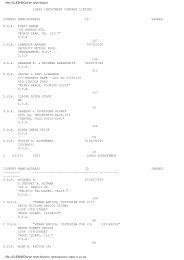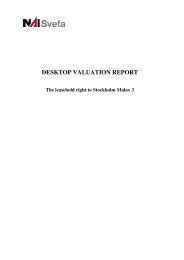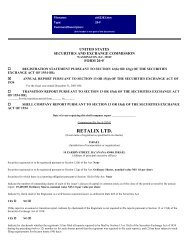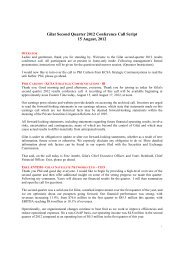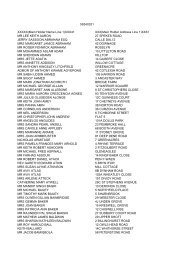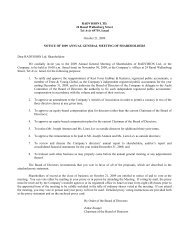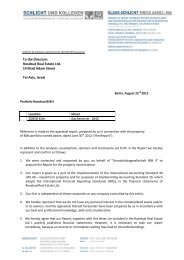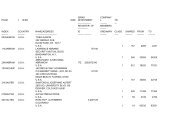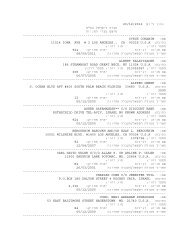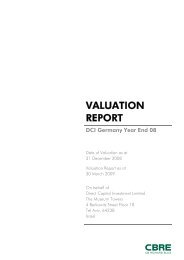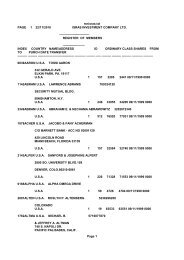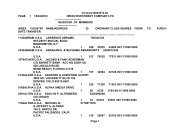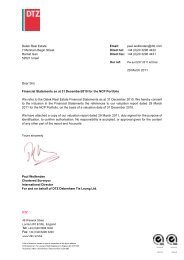XTL BIOPHARMACEUTICALS LTD.
XTL BIOPHARMACEUTICALS LTD.
XTL BIOPHARMACEUTICALS LTD.
You also want an ePaper? Increase the reach of your titles
YUMPU automatically turns print PDFs into web optimized ePapers that Google loves.
Bicifadine<br />
There are currently several patent families filed by DOV relating to Bicifadine: (i) methods and compositions containing Bicifadine for the<br />
treatment and prevention of hyperthermia; (ii) solid compositions containing the polymorph Form B of Bicifadine as characterized by certain infrared<br />
peaks and a distinct x-ray powder diffraction (XPRD) profile, and methods of treating pain in mammals using the same; (iii) methods and compositions<br />
employing a therapeutically effective amount of Bicifadine for preventing and treating a condition or symptom of acute pain, chronic pain, and/or a<br />
neuropathic disorder in mammalian subjects; (iv) methods and compositions containing Bicifadine HCl to prevent or treat neuropathic disorders in<br />
mammals, including, but not limited to, diabetic neuropathy; (v) methods and compositions containing Bicifadine for the prevention and treatment of<br />
lower urinary tract disorders; (vi) methods of making Bicifadine; (vii) methods and compositions for preventing or treating chronic pain comprising<br />
Bicifadine in combination with a non-steroidal anti-inflammatory drug (NSAID).<br />
Of these eight patent families, there is one issued patent, U.S. Patent No. 7,094,799, generally directed to solid compositions containing the<br />
polymorph Form B of Bicifadine and “substantially free” of polymorph Form A. Pending patent applications filed by DOV in 2006 include:<br />
In addition, there is one issued patent to Wyeth directed to a method of treating an addictive, compulsive disorder caused by alcohol or<br />
cocaine abuse using Bicifadine HCl. There are also three pending US applications filed by Wyeth in 2005 directed to methods for treating neuropathic<br />
disorders or conditions. At least one of these patent applications covers the use of Bicifadine in the treatment of neuropathic pain.<br />
Under the license agreement with DOV, we have exclusive worldwide rights to the above patents and patent applications for all therapeutic<br />
uses, with the exception of the the Wyeth Retained Field. Under the terms of the DOV/Wyeth agreement, Wyeth can only develop Bicifadine for use in<br />
the Wyeth Retained Field in collaboration with DOV, and under the license agreement between DOV and <strong>XTL</strong> Development, DOV will not conduct<br />
research or development with Wyeth for the use of Bicifadine in the Wyeth Retained Field. See “Item 3. Key Information-Risk Factors-Risks Related<br />
to Our Intellectual Property.”<br />
DOS<br />
• A patent application directed to sustained release formulations of Bicifadine.<br />
• A patent application directed to the use of Bicifadine for treating a disability or reducing a functional impairment associated with acute pain,<br />
chronic pain, and/or neuropathic disorders.<br />
• A patent application directed to the use of Bicifadine for preventing and treating neuropathic disorders, including, but not limited to,<br />
diabetic neuropathy, diabetic peripheral neuropathy, and neuropathy associated with alcoholism, sciatica, multiple sclerosis, spinal cord<br />
injury, chronic low back pain, HIV, cancer, etc.<br />
The lead molecules that are included in the VivoQuest license are covered by two issued patents and four patent applications. The patent<br />
applications describe both the structure of the compounds and their use for treating HCV infection. The two issued VivoQuest patents will expire in<br />
2023. Additional patent applications, if issued, will expire in 2023, 2024 and 2025. We have also filed additional patent applications that cover the lead<br />
compounds discovered since the licensing of the DOS from VivoQuest. These additional patent applications, if issued, will expire in 2026 and 2027.<br />
Based on the provisions of the Patent Term Extension Act, we currently believe that we would qualify for certain patent term extensions.<br />
We believe that Presidio will have sufficient time to commercially utilize the inventions from our small molecule development program<br />
directed to the treatment and prevention of hepatitis C infection.<br />
Other Intellectual Property Rights<br />
We depend upon trademarks, trade secrets, know-how and continuing technological advances to develop and maintain our competitive<br />
position. To maintain the confidentiality of trade secrets and proprietary information, we require our employees, scientific advisors, consultants and<br />
collaborators, upon commencement of a relationship with us, to execute confidentiality agreements and, in the case of parties other than our research<br />
and development collaborators, to agree to assign their inventions to us. These agreements are designed to protect our proprietary information and to<br />
grant us ownership of technologies that are developed in connection with their relationship with us. These agreements may not, however, provide<br />
protection for our trade secrets in the event of unauthorized disclosure of such information.<br />
21



